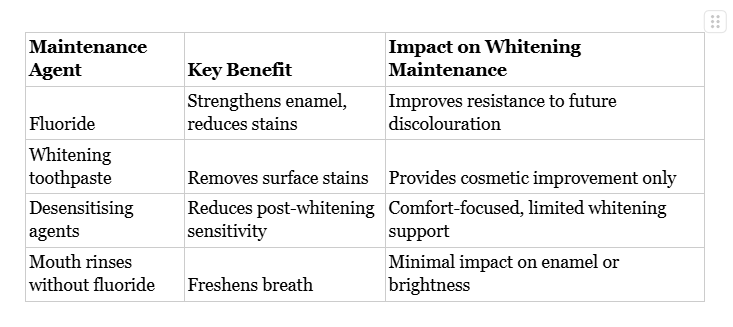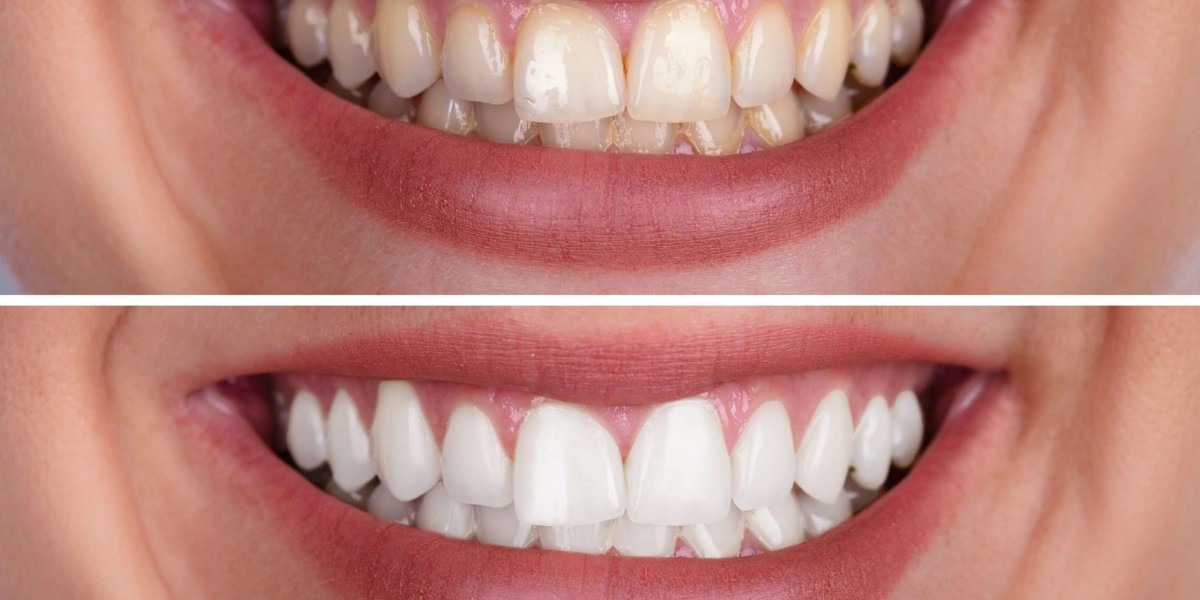Maintaining a bright and healthy smile goes beyond a single whitening treatment. While professional whitening services can deliver impressive results, sustaining that level of brightness requires ongoing care. Among the many factors that play a role in long-term maintenance, fluoride stands out as a key contributor not just for keeping teeth strong, but also for protecting the whiteness of your smile. Understanding how fluoride works and its significance will help you retain the best results from your teeth whitening treatments in Leeds.
Why Fluoride Matters for Oral Health
Fluoride is a naturally occurring mineral found in water and various dental products. Its primary function lies in strengthening tooth enamel, which is the hard, protective layer that guards against decay. When enamel is weakened by acids produced by bacteria or dietary habits, teeth are at risk of cavities, erosion, and discolouration. By aiding in the remineralisation process, fluoride restores the protective surface and makes teeth more resilient to future damage.
For patients undergoing whitening procedures, this strength is essential. Whitening treatments can leave enamel temporarily dehydrated and slightly more vulnerable. Integrating fluoride into daily oral care helps mitigate sensitivity while reinforcing enamel against long-term staining and structural weakening. Regular visits to a dentist in Leeds often include fluoride applications or recommendations tailored to sustain whitening results over time.

Fluoride and Whitening Durability
The longevity of teeth whitening depends on two factors: lifestyle choices and enamel health. Staining agents like coffee, red wine, or tobacco can darken newly whitened teeth quickly if protection is not in place. Healthy enamel acts as a shield, resisting the penetration of pigments that cause stains. This is where fluoride becomes invaluable.
Fluoride facilitates enamel remineralisation, sealing microscopic pores and reducing the likelihood of pigments settling in. In effect, stronger enamel correlates to brighter and longer-lasting results after professional whitening. Patients searching for consistent outcomes in teeth whitening Leeds should view fluoride not as an optional extra, but rather as a cornerstone of their maintenance strategy
Key Benefits of Fluoride in Whitening Maintenance
Provides a protective barrier by strengthening enamel after whitening treatments.
Reduces post-whitening tooth sensitivity, making the experience more comfortable.
Helps resist future discolouration by sealing micro-pores in enamel.
Everyday Sources of Fluoride
Fluoride can be incorporated into your whitening maintenance routine through accessible sources. The most common forms are fluoridated toothpastes and mouth rinses, which many people already use daily. Professional fluoride applications during routine dental check-ups also provide deeper protection that over-the-counter products may not deliver.
Public water supplies in some regions are intentionally fluoridated due to its proven benefits for oral health. For areas where water contains lower fluoride levels, using dental products becomes even more significant. A dentist in Leeds can assess personal fluoride needs and guide patients on balancing supplement use with everyday habits.
Fluoride vs Other Maintenance Agents
Other whitening maintenance strategies, such as whitening toothpaste or desensitising agents, often overlap with fluoride-containing products. However, unlike cosmetic solutions that polish or mask residue, fluoride actively strengthens the natural structure of the tooth. This gives it both short-term and long-term benefits that many whitening products cannot match.
The table below compares fluoride with other common maintenance agents:

Clearly, fluoride is unique in protecting both the structural and visual levels, helping maintain the results of professional whitening far more effectively.
Incorporating Fluoride After Whitening
When approaching whitening maintenance, patients often wonder whether it is enough to rely on toothpaste alone. Post-whitening fluoride gels, varnishes, or rinses can all supplement standard routines. Dentists may also recommend targeted fluoride therapies depending on the enamel’s condition after a procedure.
Fluoride rinses or gels infused with low concentrations are safe to use daily, enhancing protection against enamel erosion. For individuals prone to sensitivity, a dentist in Leeds may consider stronger fluoride varnishes applied directly after whitening to provide immediate relief while boosting protection. These treatments not only extend whitening results but also preserve overall oral health.

Practical Steps to Enhance Whitening Maintenance
Use fluoride toothpaste twice a day, especially after consuming potentially staining foods.
Schedule regular professional check-ups for dentist-applied fluoride treatments.
Rinse with a fluoride mouthwash to maximise enamel protection.
Common Misconceptions About Fluoride
Despite its widespread adoption, some patients remain hesitant about fluoride use, either due to misconceptions about safety or lack of awareness regarding its benefits. Scientifically, when used in correct concentrations, fluoride is proven to be both safe and highly effective in preventing dental deterioration.
A frequent concern is whether fluoride might interfere with whitening agents. In reality, fluoride and whitening treatments complement one another. While whitening focuses on removing stains and improving brightness, fluoride strengthens and protects enamel to preserve those results. Patients seeking teeth whitening Leeds can feel reassured that fluoride plays an essential role in sustaining results without any side effects on colour improvements.
Long-Term Whitening Success
The journey to a brighter smile does not end once the whitening procedure is completed. Instead, it requires responsibility and commitment to good oral habits. Daily brushing and flossing, professional cleanings, and the incorporation of fluoride significantly increase the chances of enjoying a whiter smile for years.
When combined with sensible lifestyle choices such as reducing coffee or smoking, fluoride lays the groundwork for long-term success. While other products may provide quick aesthetic fixes, fluoride goes deeper, ensuring enamel is resistant to future damage that otherwise compromises both colour and structure. Patients who regularly visit a dentist in Leeds are best positioned to retain their whitening results thanks to professional care and prevention-focused strategies involving fluoride.
Video Link : https://vimeo.com/1063039628/ad27ec2bd0?share=copy
Conclusion
Fluoride’s role in whitening maintenance is both protective and restorative, ensuring enamel stays strong while resisting stains that dull results. For patients who want long-lasting effects from their teeth whitening Leeds treatments, fluoride is not optional—it is essential. Working closely with a trusted dentist in Leeds will ensure that enamel remains well-protected, brightness is preserved, and oral health is supported in the long term. At EDL, we believe every patient deserves a healthy, confident smile that lasts.

